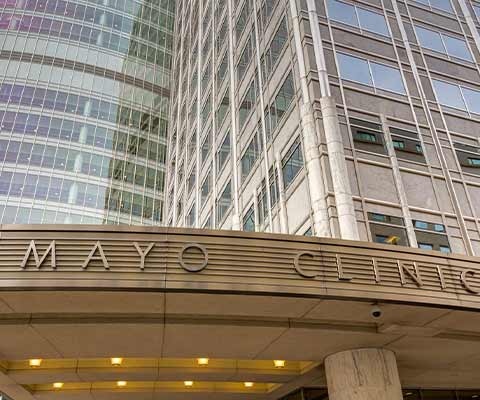Mayo Clinic
Exact Sciences has a long-standing collaborative relationship with scientists and clinicians at Mayo Clinic in Rochester, Minnesota. Our relationship is built on a shared philosophy, cultural alignment, and an open exchange of ideas.
In 2009, Kevin Conroy and Dr. Graham Lidgard of Exact Sciences met with Dr. David Ahlquist of Mayo Clinic to discuss a novel approach for colorectal cancer screening. Together, they invented Cologuard®. the first and only FDA approved, non-invasive stool DNA colorectal cancer screening test.
Exact Sciences and Mayo Clinic also began a broad research and development collaboration focused on identifying biomarkers for 15 of the deadliest cancers.
The team is now headed by John B. Kisiel, M.D., Division of Gastroenterology and Hepatology, at Mayo Clinic’s Rochester campus and includes many dedicated colleagues in their clinical research labs.

Mayo Clinic and Dr. John Kisiel have financial interest in this collaboration. Mayo Clinic will use any revenue it receives to support its not-for-profit mission in patient care, education and research.
See our collaboration
with Mayo Clinic
at work
Johns Hopkins University
Our collaboration with Johns Hopkins University stems from our acquisition of Thrive Earlier Detection. Thrive’s innovative multi-cancer screening technology was pioneered by a team of researchers from the Johns Hopkins University School of Medicine, including:
- Bert Vogelstein: a pioneer in cancer genomics and the first scientist to elucidate the molecular basis of a common human cancer
- Dr. Nickolas Papadopoulos: an expert in cancer diagnostics and the development of diagnostic tests
- Kenneth W. Kinzler: an expert on the molecular and genetic analysis of human cancer
TGen, an affiliate of City of Hope
We entered into a multi-year collaboration with TGen following our acquisition of Ashion Analytics. We also have an exclusive license to TGen’s proprietary TARDIS technology, which can detect small amounts of tumor DNA in blood. TGen’s expertise will be critical in developing differentiated minimal residual disease testing capabilities and establishing the clinical evidence necessary to drive adoption.
TGen became a part of City of Hope in 2016 to accelerate the speed at which scientists and medical staff convert research discoveries into cures for patients. City of Hope is a National Cancer Institute-designated comprehensive cancer center and a founding member of the National Comprehensive Cancer Network, making it a national leader in advancing research and treatment protocols.